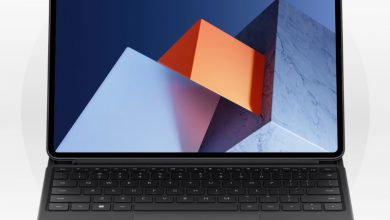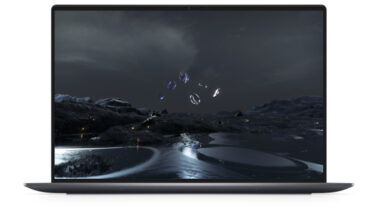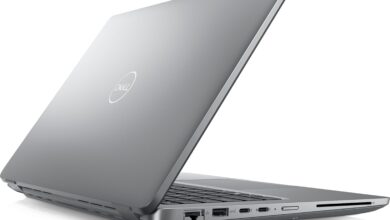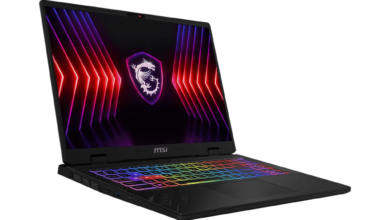The laptop we will be reviewing is the MSI Titan GT77 2022 model, which features the Intel Core i9-12900HX processor and the NVIDIA RTX 3080 Ti graphics. The model number we received for review is GT77-12UHS. It is also observed that there is no significant difference in specifications between the MSI GT77 variants. The model we got had 64GB of RAM and could be upgraded to a maximum of 128GB of RAM. It supports quad-channel memory, as it has four RAM slots. The laptop supports the latest PCIe 5.0 protocol (available in only one slot), which is the best you’ll find in a laptop.
If we compare it to competitors like the ASUS ROG Zephyrus M16 (2022) and Stealth GS77, the MSI Titan GT77 may not have a great appearance, but it offers better performance thanks to its Core i9-12900HX processor.
Specifications
| Screen | 17.3″ UHD (1920 x 1080), 360Hz, IPS-Level, 100% sRGB |
| Processor | Intel Core i9-12900HX processor, 75W |
| Wireless Connection | Killer Wi-Fi 6E AX1675, Killer ax Wi-Fi 6E, Bluetooth v5.2 |
| Graphics card | NVIDIA GeForce RTX 3080 Ti GPU, 16GB GDDR6, 175W |
| Memory | 64GB quad-channel DDR5 memory, four slots, max 128GB RAM |
| Storage | Two 1TB M.2 PCIe 4.0 NVMe SSD Total four slots: three M.2 SSD slots (NVMe PCIe Gen4), one M.2 SSD slot (NVMe PCIe Gen5) |
| Ports | 2x Type-C (Thunderbolt 4) 3x Type-A USB 3.2 Gen 2 1x RJ45 1x SD Express card reader 1x HDMI 1x Mini-DisplayPort |
| Battery | 4-Cell, 99.99Wh Li-polymer battery with 330W AC adapter |
| OS | Windows 11 Home Windows 11 Pro |
| Weight | 7.27 lbs. (3.3 kg) |
Design
The MSI Titan GT77 maintains the same design as the MSI Titan series, with the classic MSI dragon logo on the back cover of the display. The size of the laptop feels more prominent thanks to the 17-inch display, and the overall appearance seems classic.
The dimensions of this laptop in its closed state are 397 x 330 x 33 mm, and the weight is 3.3 kg. In the open state, it has a thickness of 23 mm.
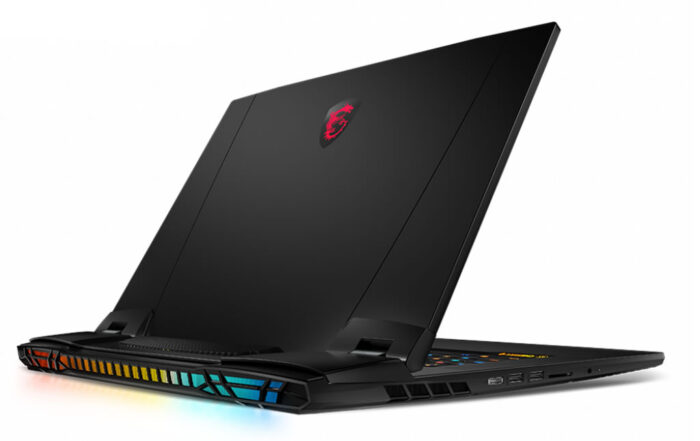
Display
The 17.3-inch IPS screen in the MSI Titan GT17.3 is one of the main highlights of this laptop. The variant we’re reviewing has a Full HD 1920×1080 display and a 360Hz refresh rate. However, it also has a 4K resolution, a 120Hz refresh rate, and a 100% DCI-P3 color gamut option.
It also comes with a built-in MSI True Color app that allows you to choose from a variety of color preset modes for different usage scenarios. In addition, you can also modify the color according to your needs.

In the upper bezel, the manufacturer has integrated an infrared webcam that allows HD video recording at 30fps. The webcam module also supports Windows Hello face recognition, which allows you to unlock your laptop with a single click.
To test the screen, we used the Spyder X calibration, and we found the following results: the display has 96% sRGB color gamut, 72% Adobe RGB color gamut and 71% DCI-P3 color gamut. The contrast ratio is about 1090:1 and the maximum brightness is 301.5 nits. Its average DeltaE is only 1.85 (max 7.05, min 0.48). When DeltaE is between 1.6 and 3.2, it will meet the needs of the average user.
Keyboard
The MSI Titan GT77 comes with SteelSeries’ Cherry Mechanical Per-Key RGB gaming keyboard. The keyboard feels very thin and light. It features a SinkZone sunken design that is eye-catching and extends the life of the keyboard. The keyboard has a key travel of 1.8 mm. According to the official description, the keyboard has a 15 million key press life and features scratch-resistant, abrasion-resistant and IP40 dust-proof certified keycaps.
The overall user experience of the keyboard was quite good. Like other MSI gaming laptops, this one also supports per-key RGB backlight customization, allowing users to customize the backlighting of each key via MSI Center or SteelSeries software.
Speaker and Ports
Around the keyboard, the speaker grille can be seen. The laptop has two 2W tweeters and two 2W woofers, forming a Dynaudio sound system in addition to Hi-Res Audio and Nahimic certified sound, creating an environment for users to enjoy immersive audio-visual enjoyment.
On the left side, there is a charging port, two USB Type-A 3.2 Gen 2 ports, an SD Express card reader, and a 3.5mm headphone jack.

On the right side, there are a USB Type-A port, two USB Type-C ports, a Mini DisplayPort port, an HDMI port, and an RJ45 port. With these numerous ports, users won’t need to purchase an additional dock.
Battery and charging
The MSI Titan GT77 comes with a large 4-cell 99.99Wh battery. After removing the back cover, we found out more about the battery. This is a 15.2V, 6678mAh Li-polymer battery.
We used PCMark 10 to test the battery life. We made the following settings: the power mode is set to best energy efficiency, the fan is set to silent mode (via MSI Center), only use the Intel Iris Xe GPU (not using the RTX 3080 Ti), and the screen brightness is 50%. The test started at 94% and ended at 4%. We got 6 hours of battery life, which seems to be enough in the gaming laptop segment.
MSI also provides a 330W AC adapter to charge the battery quickly. However, fast charging is not a basic need for gaming laptops, as most gamers play games plugged into their chargers.
RAM, SSD, and Network
This laptop has four memory slots, all of which support DDR5 memory. It supports up to 128GB of RAM. The laptop we received comes with 64GB of RAM, including four Samsung 16GB of DDR5 RAM (clocked at 4800MHz).
One drawback we found for quad-channel memory is that the memory frequency can only reach a maximum of 4000 MHz due to CPU limitations. Another variant with 32GB of RAM did not have this issue. To test the memory, we used AIDA64, and the results were as follows: a read speed of 62,745 MB/s, a write speed of 60,114 MB/s, a copy speed of 63,501 MB/s, and a latency of 91.4 ns. It is expected that the benchmarks would have been better if the actual maximum frequency of the memory had been reached. Furthermore, if we compare the benchmark results with the memory benchmark results of the models we have reviewed (especially the MSI Stealth GS77 and the Zephyrus M16 (2022)), we find that there is not a huge difference in memory performance.
This laptop has four M.2 SSD slots, one of which supports the latest NVMe PCIe Gen5 SSDs, and the other three support NVMe PCIe Gen4 SSDs. The review variant we got comes with four Samsung 1TB NVMe PCIe 4.0 SSDs.
To test the SSD, we used CrystalDiskMark software and obtained the following results: 6669.56 MB/s for sequential read, 4987.14 MB/s for sequential write, 98.18 MB/s for 4K random read, and 290.35 MB/s for 4K random write. According to its category, the benchmark results are pretty satisfactory.
The MSI Titan GT77 is equipped with Killer Gb LAN and a Killer AX Wi-Fi 6E AX1675 wireless card, and supports Bluetooth v5.2. It is worth mentioning that the WLAN card is installed in the M.2 slot on the motherboard. Thanks to the Wi-Fi 6E network compatibility, the laptop can achieve a 6GHz network band, which delivers lightning-fast speeds even in congested environments while maintaining a stable network.
CPU Benchmark
The MSI Titan GT77 is powered by the Intel Core i9-12900HX processor, which is Intel’s highest-end and best CPU. The processor has 16 cores, 24 threads, and 30MB of L3 cache. The manufacturer has further unlocked the power consumption of the CPU to 75W.
To test the CPU performance, we also did some benchmarks, which are listed below:
CPU-Z: The CPU scored 786 points on single-threaded and 10,085 points on multi-threaded.
Cinebench: This benchmark was done on different versions of Cinebench
- Cinebench R15: 275 points on single-threaded and 3,611 points on multi-threaded
- Cinebench R20: 731 points on single-threaded and 8,960 points on multi-threaded
- Cinebench R23: 1,890 points on single-threaded and 23,105 points on multi-threaded
The Core i9-12900HX is very strong on the MSI Titan GT77. Compared to the Ryzen 9 6900HS, the Core i9-12900HX delivers 17.5% faster single-core performance and 50.8% faster multi-core performance. Compared to the Core i9-12900H in the MSI Stealth GS77 and ROG Zephyrus M16 (2022), single-core performance is 8.4% faster and multi-core performance is 39.1% faster.
GPU Benchmark
This laptop comes with the latest RTX 3080 Ti graphics card. The card has 16GB of GDDR6 memory, 7424 CUDA cores, 256-bit bus width, and 512GB/s bandwidth.
It’s worth noting that the card also supports dual-screen displays and three-mode switching (independent display direct, hybrid output, and integrated display mode), which users can quickly switch via MSI Center. We also benchmarked the card (using independent display direct mode), and the results are as follows:
3DMark Fire Strike: The total score was 29,311, while the GPU score was 34,282.
3DMark Fire Strike Extreme: The overall score was 16,105, while the GPU score was 16,683.
3DMark Time Spy: The total score was 13,612, while the GPU score was 13,605.
3DMark Time Spy Extreme: The overall score was 6,531, while the GPU score was 6,601.
Gaming Test
We also conducted gaming tests, including Cyberpunk 2077 and Borderlands 3. The gaming performance of the MSI Titan GT77 can be judged at a glance through the gaming tests.
Borderlands 3: In this game, the resolution was set to 1080p, and the image quality was set to high. The average frame rates were 115fps.
Cyberpunk 2077: In this game, all the options were turned on, and the resolution was set to 1080p. We achieved an average frame rate of 98.13 fps.
Crysis 5: In this game, the graphic settings were extremely high, while the resolution was 1080p. The average frame rate was 165fps.
The variant we’re reviewing has a screen with a 1920×1080 resolution and a 360Hz refresh rate. It also has a variant with a 4K resolution with a 120Hz refresh rate. If you want to play 4A games in 3K resolution, then this laptop is also suitable. It is also recommended to turn on NVIDIA’s DLSS technology. With a 120Hz refresh rate, you’ll still get a smoother gaming experience.
Heat Dissipation and Stress Testing
Inside the notebook, there is a high-end cooling system named “Titan Cooling”, which consists of four fans, seven pipes and six exhausts. With this powerful cooling system, it’s time to check what happens to the CPU and GPU during stress testing.

CPU Stress Testing:
We used the AIDA64’s FPU Roaster for this test. When the test begins, the turbo power consumption reaches a maximum of 175W. After 15 minutes of testing, the CPU’s power consumption was approximately 125W, and its temperature was around 93°C.
GPU Stress Testing:
We used FurMark for this test. The resolution is set to 1080p, and anti-aliasing is turned off. After 15 minutes of testing, the average frequency was approximately 1362 MHz, while the peak frequency reached 1571 MHz. The maximum temperature was around 79°C, and the power consumption increased to 175W.
CPU + GPU Combine Stress Test:
In this test, we used FurMark’s CPU Burner instead of AIDA64 for CPU stress testing.
After 15 minutes of testing, the conditions of the CPU are as follows: 75W power consumption, 72°C peak temperature, and the maximum frequency of the P-Core is 3.2GHz, while the maximum frequency of the E-Core is 2.6GHz. The GPU conditions were 176W peak power consumption, 80.2°C peak temperature, and an average frequency of 1331 MHz, with a maximum frequency of 1652 MHz.
The overall power consumption reaches 253W (250W officially claimed). Throughout the stress test scenario, the Titan cooling system in the MSI Titan GT77 handled everything smartly.
Also Read: MSI Stealth GS77 Review (i9-12900H, RTX 3080Ti)
Summary:
There is no doubt that the Core i9-12900HX is one of the best processors you can buy. Its performance is far better than its competitors, especially the Ryzen 9 6900HS and Core i9-12900H. In addition, when combined with the RTX 3080 Ti, we have found that it handles all triple-A games very efficiently with a higher refresh rate and Full HD video quality. In stress tests, we also saw that the Titan cooling system of the MSI Titan GT77 is very clever and effective at dissipating the heat generated, ensuring that users don’t have to worry about overheating when gaming heavily.
The laptop we reviewed is a review model and is not for sale. However, the variant with almost identical specifications retails for around $5,000. The company also sells lower versions at more favorable prices.


